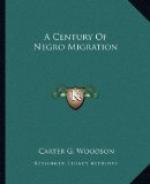Augustus Wattles, a Quaker from Connecticut, made a settlement in Mercer County, Ohio, early in the nineteenth century. In the winter of 1833-4, he providentially became acquainted with the colored people of Cincinnati, finding there about “4,000 totally ignorant of every thing calculated to make good citizens.” As most of them had been slaves, excluded from every avenue of moral and mental improvement, he established for them a school which he maintained for two years. He then proposed to these Negroes to go into the country and purchase land to remove them “from those contaminating influences which had so long crushed them in our cities and villages."[18] They consented on the condition that he would accompany them and teach school. He travelled through Canada, Michigan and Indiana, looking for a suitable location, and finally selected for settlement a place in Mercer County, Ohio. In 1835, he made the first purchase of land there for this purpose and before 1838 Negroes had bought there about 30,000 acres, at the earnest appeal of this benefactor, who had travelled into almost every neighborhood of the blacks in the State, and laid before them the benefits of a permanent home for themselves and of education for their children.[19]
This settlement was further increased in 1858 by the manumitted slaves of John Harper of North Carolina.[20] John Randolph of Roanoke endeavored to establish his slaves as freemen in this county but the Germans who had settled in that community a little ahead of them started such a disturbance that Randolph’s executor could not carry out his plan, although he had purchased a large tract of land there.[21] It was necessary to send these freemen to Miami County. Theodoric H. Gregg of Dinwiddie County, Virginia, liberated his slaves in 1854 and sent them to Ohio.[22] Nearer to the Civil War, when public opinion was proscribing the uplift of Negroes in Kentucky, Noah Spears secured near Xenia, Greene County, Ohio, a small parcel of land for sixteen of his former bondsmen in 1856.[23] Other freedmen found their way to this community in later years and it became so prosperous that it was selected as the site of Wilberforce University.
This transplantation extended into Michigan. With the help of persons philanthropically inclined there sprang up a flourishing group of Negroes in Detroit. Early in the nineteenth century they began to acquire property and to provide for the education of their children. Their record was such as to merit the encomiums of their fellow white citizens. In later years this group in Detroit was increased by the operation of laws hostile to free Negroes in the South in that life for this class not only became intolerable but necessitated their expatriation. Because of the Virginia drastic laws and especially that of 1838 prohibiting the return to that State of such Negro students as had been accustomed to go North to attend school, after they were denied this privilege at home, the father of Richard DeBaptiste




